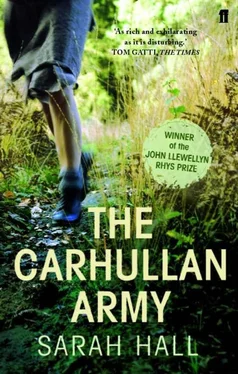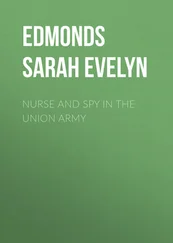Sarah Hall - The Carhullan Army
Здесь есть возможность читать онлайн «Sarah Hall - The Carhullan Army» весь текст электронной книги совершенно бесплатно (целиком полную версию без сокращений). В некоторых случаях можно слушать аудио, скачать через торрент в формате fb2 и присутствует краткое содержание. Год выпуска: 2008, Издательство: Faber and Faber, Жанр: Современная проза, на английском языке. Описание произведения, (предисловие) а так же отзывы посетителей доступны на портале библиотеки ЛибКат.
- Название:The Carhullan Army
- Автор:
- Издательство:Faber and Faber
- Жанр:
- Год:2008
- ISBN:нет данных
- Рейтинг книги:4 / 5. Голосов: 1
-
Избранное:Добавить в избранное
- Отзывы:
-
Ваша оценка:
- 80
- 1
- 2
- 3
- 4
- 5
The Carhullan Army: краткое содержание, описание и аннотация
Предлагаем к чтению аннотацию, описание, краткое содержание или предисловие (зависит от того, что написал сам автор книги «The Carhullan Army»). Если вы не нашли необходимую информацию о книге — напишите в комментариях, мы постараемся отыскать её.
The Carhullan Army — читать онлайн бесплатно полную книгу (весь текст) целиком
Ниже представлен текст книги, разбитый по страницам. Система сохранения места последней прочитанной страницы, позволяет с удобством читать онлайн бесплатно книгу «The Carhullan Army», без необходимости каждый раз заново искать на чём Вы остановились. Поставьте закладку, и сможете в любой момент перейти на страницу, на которой закончили чтение.
Интервал:
Закладка:
They turned when they saw me and stopped eating, and for a long minute I endured their full scrutiny, uncivil and raw. I scanned the rows for a face that I could recognise — Megan, Lorry or even Jackie — but there was no one I could quietly implore to rise and seat me, introduce me, or serve as my guide in this unfamiliar realm.
Facing me were women of all ages, some with grey in their hair, some with long braids, and others with eccentrically cropped styles. They were mostly dressed as the women I’d met on the moors had been, practically, with thrift and a certain bespoke artistry. Some had overalls that seemed extreme and invented, tribal almost. Others had panels and shapes shaved into their heads. They wore straps of leather around their wrists and upper arms, and stone pendants: their smocks and shirts were cut down, resewn, and there was a small girl among them with her face painted blue, and blue stains on her jumper. No one else had on a yellow tunic. The bright item I was wearing suddenly seemed more like a convict’s uniform than it did my banner of belonging. I tried to smile and greet them but my mouth was paralysed. All I could do was remain still, silently waiting for someone to tell me what to do.
I heard whispering along the bench. Then, one by one, they stood up, as if about to change shift. I thought perhaps they were leaving, because my presence had somehow triggered offence, because I was not wanted here. But instead they picked up their knives and began knocking the handles on the tabletop, quietly at first, then louder. They looked straight at me and banged down on the wood, and the plates in front of them jumped and clattered. Bits of food spilled off the earthenware onto the scrubbed oak. The knives flashed silver in their hands. The little girl leapt up and down on the bench.
I blinked fast and involuntarily in the racket. The sound rang through me as if I were made of glass and might shatter if it continued, so brittle and thin was my spirit. I was rooted to the floor, afraid to move forward, unable to turn and leave, not knowing whether to ask for mercy or somehow stand my ground against them. The drumming went on and on, and I felt its tattoo echoing in the hollowness of my body.
I knew then that I was nothing; that I was void to the core. To get here I had committed a kind of suicide. My old life was over. I was now an unmade person. In the few days that I had been at Carhullan nobody had called me anything other than Sister, though they had seen my identification card and knew my name, and I had shouted out my story over and over from behind the metal walls of the dog box, trying to engage their sympathies, trying to tell them who I was. The person I had once been, the person who had walked out of the safety zones and up the mountain, was gone. She was dead. I was alive. But the only heartbeat I had was the pulse these women were beating though me.
It was not until the first of them left the table, came forward and took hold of my neck and kissed my mouth, while the others continued to knock their cutlery, and when the woman next to her followed suit, and the next, and the next, that I began to understand what was happening. I realised what the noise was. It was not a clamour intended to drive me out or to let me know I bore some kind of stigma. It was the sign of acceptance I had been waiting for. It was applause.
*
The following morning Jackie waited for me after the breakfast shift, gesturing for me to get ready, and I hurried upstairs to put on warm clothes and went out with her onto Carhullan’s land. After my appearance in the kitchen, my boots had been given back to me together with my clothes, cleaned and dried and folded. I had the use of the indoor bedroom until otherwise notified, Lorry had told me, until I got well enough to handle something less luxurious. Then I’d be moved out into one of the dormitories. ‘Make the most of it while you can,’ she said. ‘It’s no fun dotting over that stream to take a piss in the middle of the night. Believe me, I know. I did it for years. And the other girls will keep you up gabbing, I have no doubt about that.’
I noticed the other women watching as Jackie and I passed by on our way out of the farmhouse. They had not been unfriendly; I had shaken hands, learned a few names, but for the time being they were mostly steering clear of my company.
We did not go far. My legs were still sore and I was light-headed from days of undernourishment. I apologised to Jackie for my condition when I had to pause and rest, but she said not to worry. ‘You’ll be right soon enough,’ she told me. ‘Back when I served, I saw people come out of the box and never get well. It kills your head. You’re stronger than that. Keep eating what they give you. And keep taking butter on it, like the others do.’ I warmed at her compliment but I knew it was too generous. At least once or twice a night the terrors of that confinement woke me in a sweat, and I would cry out as if still trapped there.
As we walked around the estate’s inner fields, she listed the illnesses that I should watch out for, and could probably expect to get. Anything that brought a fever with it was a real problem, and I should tell Lorry immediately. Anaemia was a risk. When she heard I didn’t eat red meat Jackie scowled and shook her head. ‘That’s going to have to change, Sister. I’m going to get Ruthie to give you liver this week. It’ll do you more good than anything else.’
There were gastro-sicknesses occasionally — the outside toilets were old and bugs got passed around. I should clean up well after myself, she said, put the sawdust mix down after a shit, boil my cloths clean every month, and adhere to good rules of hygiene, though it would mean braving the cold outdoor showers every day. Some of the girls had warts; not much could be done about that. Constipation; after four days something had to be done about this. There was a bit of cockie about, she said — I did not know what she meant but I made a note to ask Lorry later. Women had thrush. There were ring-worms. Parasites. I’d get giardiasis if I drank anything other than water piped from the well. Even then it might happen. It was an inconvenience. But eventually I’d be immune, she said.
We crossed the soft earth furrows. The small irregular trees I had been marched past on entering Carhullan were sago palms; they thrived better in the new humidity of the summer than the traditional plants did, Jackie told me. Corn and rye too. There had been years when the wheat crop had failed completely, and they had been hard years to endure. The oats and the potatoes seemed to manage in the wet conditions. These were the farm staples.
We collected a batch of eggs from the quail coops, then ventured a little way out onto the fell, and Jackie showed me how to set the hillside snares at the lips of the burrows. ‘Can’t eat rabbits too often,’ she said. ‘Not enough nutrition in the buggers to do you any good — but they’re OK for filling up the gut now and then, and that’s half the battle won. They make you fart like nobody’s business, the table empties pretty quickly on smoor night, I can tell you.’ She said this seriously, smiled a crooked smile a moment later, and caught herself chuckling. Then her face altered, recomposing itself. She would not allow levity to remain with her long.
The next morning I felt stronger and we went higher on the mountain. The November sky was ash-blue and the clouds moved fast above us. The wind never let up on the fell. Though it was in the lee of High Street, Carhullan was still exposed. The shapes of the trees on the ridge were distorted; they leaned hard to the east. I turned to look at the farm and felt the air kiting at my back. From above I could see why the walls and hedges of the growing plots had been built so tall around the farm, and why the central house stood protected by its barns and pens. It was savaged by the elements. But the upland weather felt cold and clean, and I relished it.
Читать дальшеИнтервал:
Закладка:
Похожие книги на «The Carhullan Army»
Представляем Вашему вниманию похожие книги на «The Carhullan Army» списком для выбора. Мы отобрали схожую по названию и смыслу литературу в надежде предоставить читателям больше вариантов отыскать новые, интересные, ещё непрочитанные произведения.
Обсуждение, отзывы о книге «The Carhullan Army» и просто собственные мнения читателей. Оставьте ваши комментарии, напишите, что Вы думаете о произведении, его смысле или главных героях. Укажите что конкретно понравилось, а что нет, и почему Вы так считаете.












